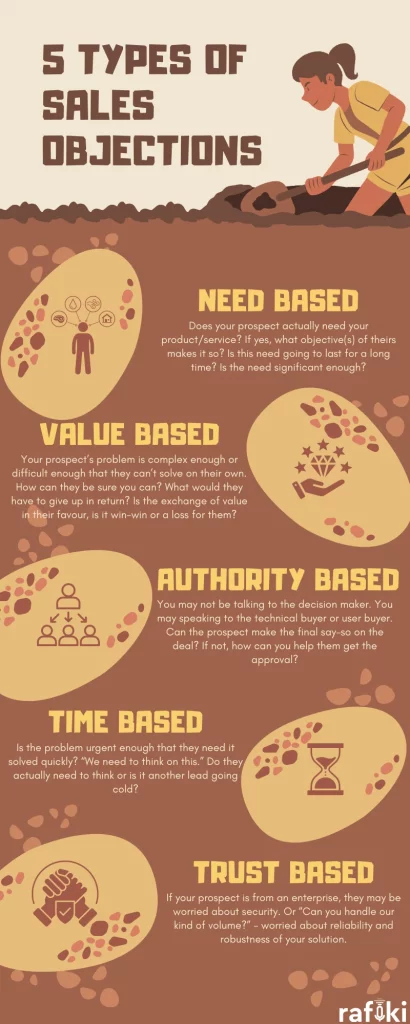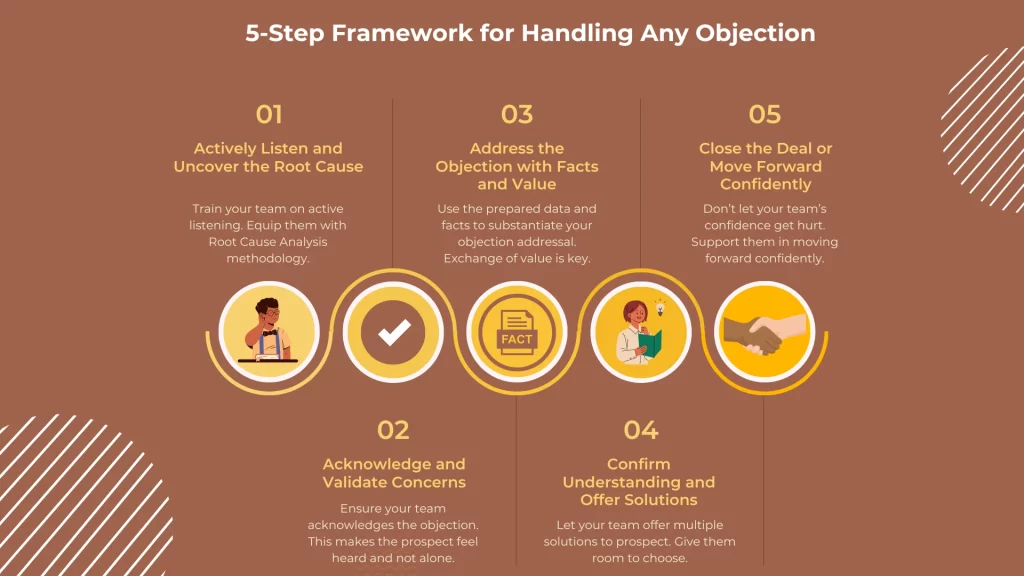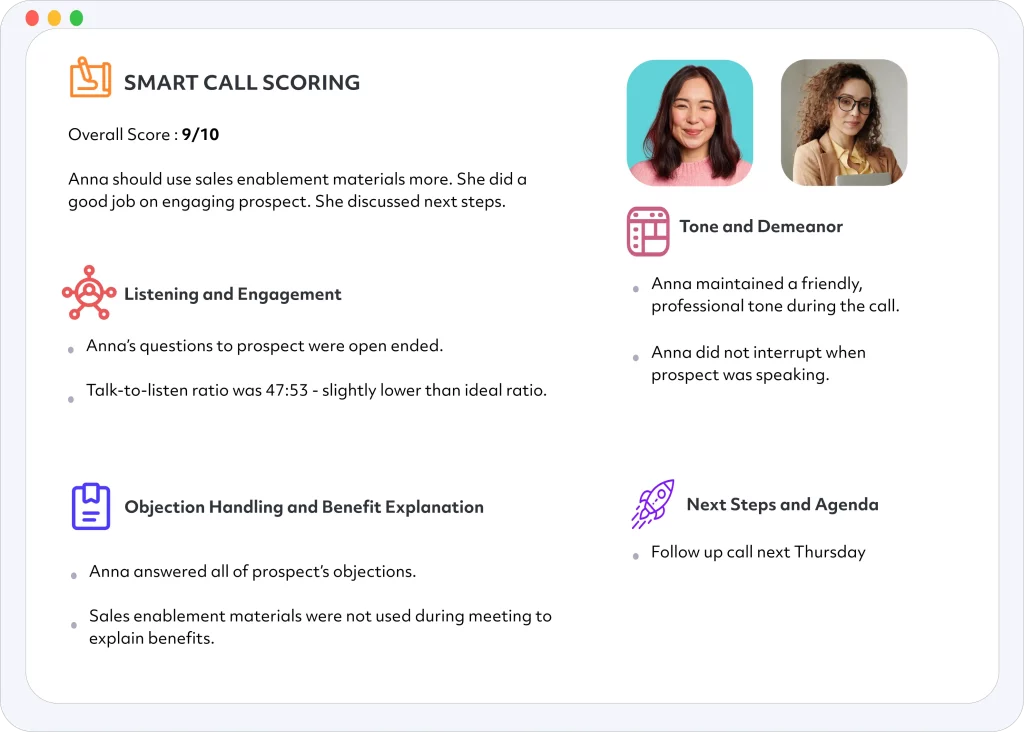Why Rafiki
Pricing


Pricing
Solutions

RevOps Leaders
Synchronize revenue generating functions

SDR Leaders
Get your team aligned and Coach your Reps 3x faster at scale

Sales Leaders
Unlock pipeline truth, drive confident forecasts

Ah, objections. Those pesky roadblocks that can derail even the smoothest sales conversation, leaving you feeling like you've hit a brick wall. Objection handling, while seemingly daunting, is actually a valuable opportunity to connect deeper with your prospects, address their concerns, and ultimately move them closer to a "yes."
This article will explore the top 10 common sales objections and how to handle them. We’ve also included a powerful 5-step framework for handling any objection (that was not covered here) thrown your way. With this framework in your arsenal, you'll be able to transform objections into opportunities.
Let’s dive in.
In essence, sales objections are expressions of doubt or hesitation voiced by potential customers during the sales process. These objections can range from concerns about price and value to questions about product features and fit. While they might feel like roadblocks in the moment, objections actually signal a prospect's engagement and indicate their interest in learning more.
Think of it this way: someone wouldn't bother expressing an objection if they weren't genuinely considering your product or service. Therefore, effectively handling objections isn't just about overcoming hurdles; it's about building trust, strengthening relationships, and demonstrating the true value of what you offer.
By addressing their concerns head-on, you can transform objections into stepping stones on the path to closing the deal.
Sales objections come in all shapes and sizes, but understanding the underlying themes can help you develop a more strategic approach to handling them. Here are some of the most common categories you'll encounter:

These objections question whether your prospect truly needs your product or service. They might say, "We're happy with our current solution," or "We don't have the budget for this right now."
These objections express doubt about the value proposition of your offering. They might ask, "Why is your product more expensive than others?" or "How can you guarantee it will solve our problem?"
These objections suggest the decision-maker isn't the right person to approve the purchase. You might hear, "I need to run this by my manager," or "We have a specific procurement process."
These objections highlight the prospect's lack of time or resources to implement your solution. They might say, "We're too busy right now," or "We need more time to evaluate our options."
These objections stem from a lack of trust in your company, your product, or yourself. They might express concerns about data security, customer service, or your track record.
These categories are not mutually exclusive. A single objection might encompass elements of several categories. By understanding the root cause behind each objection, you can tailor your response to effectively address the prospect's specific concerns and move the conversation forward.
Here's where Rafiki's Smart Call Summary can be incredibly helpful. This feature automatically generates detailed summaries of your calls, capturing key decision-makers, pain points discussed, and next steps. This allows you to quickly refresh the rep’s memory on the specific concerns raised during the call and craft a personalized response that directly addresses them.
Equipped with the 5-step framework and armed with the right resources, you're ready to tackle any objection. Here's a breakdown of 10 common sales objections and strategies to address them effectively:
Now that you're armed with an understanding of the different objection types, let's delve into the 5-step framework that will empower you to conquer them all:

This is arguably the most crucial step. Before launching into a rebuttal, actively listen to the objection without interrupting. Use open-ended questions like "Can you tell me more about that?" and "What specific concerns do you have?" to uncover the underlying reason behind the objection. This demonstrates empathy and helps you avoid making assumptions.
Let your prospect know you heard and understood their concerns. Phrases like "I understand your hesitation" and "It's important to address your concerns" show that you value their perspective and build rapport.
Now, it's time to address the objection head-on. Use data, case studies, and testimonials to demonstrate the value your solution brings. Don't just talk about features; focus on the benefits that directly address the specific concern raised. For instance, if they question the price, showcase how your product can save them money in the long run through increased efficiency or reduced costs. Rafiki's Smart Follow Up can be a valuable tool in this step. This feature automatically generates personalized follow-up emails based on the conversation, allowing you to reinforce key points and share relevant data or case studies that address their specific concerns. This saves you time while ensuring your message is tailored to their needs.
Summarize the objection and your response to ensure you're on the same page. Then, offer specific solutions that directly address the concern. This could involve proposing a trial period, offering additional resources, or customizing the solution to better meet their needs.
Don't be afraid to ask for the sale after effectively addressing the objection. However, if they're not ready to close yet, move the conversation forward confidently. You can schedule a follow-up call to answer any further questions or offer additional information as they progress through their decision-making process.
Keep in mind, objection handling is an ongoing dialogue, not a one-time event.
Equipping your sales team with the skills and resources to handle objections effectively is crucial for boosting their confidence and closing more deals. Here are some key strategies sales leaders can implement:
Invest in comprehensive sales training that includes dedicated modules on objection handling. This training should not only cover the 5-step framework and various objection types, but also equip reps with the communication skills and active listening techniques needed to navigate these conversations effectively.
Regular role-playing exercises are also invaluable. By simulating real-world scenarios and practicing responses to common objections, reps can build confidence, identify areas for improvement, and refine their handling skills in a safe and controlled environment.
Don't leave your reps hanging after training. Provide them with easy access to readily available resources that support effective objection handling. This could include:
Create a supportive and collaborative environment where reps feel comfortable sharing their experiences and learning from each other. Encourage open communication and feedback sessions where reps can discuss their encounters with objections, share successful strategies, and identify areas for improvement. This fosters a culture of continuous learning and allows the team to collectively grow their objection handling skills.
Sales technology like Rafiki can be a game-changer in this process. Rafiki's Ask Rafiki Anything feature allows reps to ask specific questions about their performance, deals, or accounts, receiving data-driven insights and actionable recommendations. This empowers them to proactively identify potential objection areas and prepare tailored responses based on historical data and insights from previous interactions.
Knowing your reps are equipped with objection handling skills is crucial, but measuring their effectiveness takes it a step further. Here's how sales leaders can track and improve their team's objection handling capabilities:

Objections, once viewed as roadblocks, can now become stepping stones to success. By embracing the 5-step framework and leveraging the power of conversation intelligence tools like Rafiki, you can transform objections into opportunities to build trust, showcase value, and ultimately, close more deals.
Track and guide objection handling
By continuously learning, refining your team’s skills, and leveraging data-driven insights, you can empower your team to conquer objections like pros and achieve remarkable sales success. Explore how Rafiki can empower your team to handle objections like pros by signing up for a free 14 day trial!